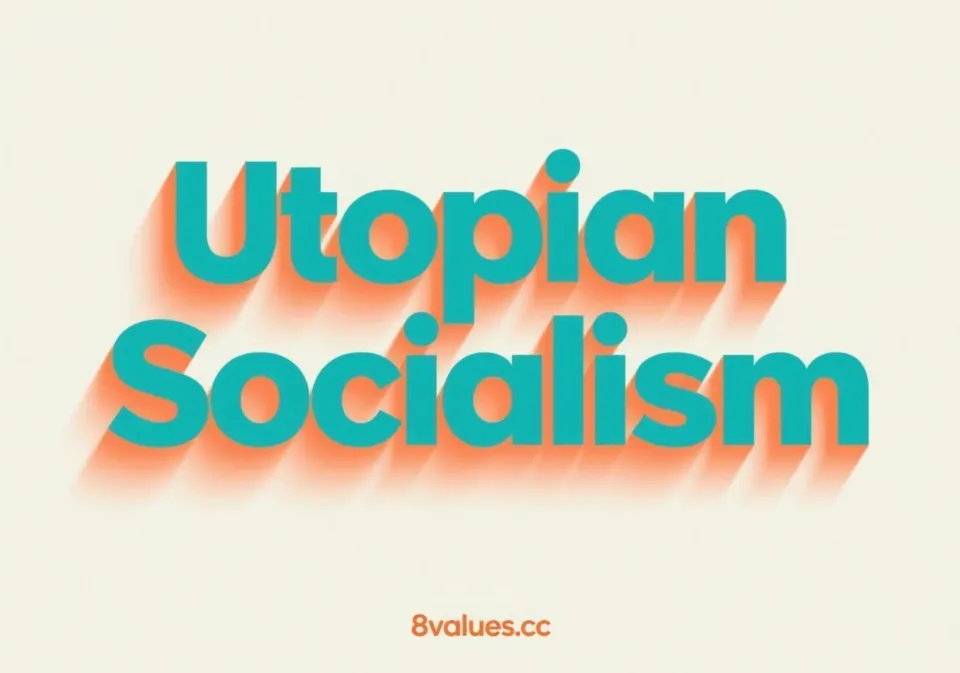Exploring Utopian Socialism: Sources of Thought, Representative Figures and Scientific Criticism
Utopian Socialism is an early form of modern socialist thought. It was first seen in Thomas More's "Utopia" in the 16th century and reached its peak in the early 19th century. Its main representatives include Saint-Simon, Fourier and Owen. Utopian socialists advocated eliminating the shortcomings of capitalism by establishing an ideal community and moral influence based on the principle of cooperation, and were committed to drawing a detailed social blueprint. This formed a fundamental opposition and inheritance relationship with the scientific socialism later founded by Karl Marx and Friedrich Engels in terms of implementation approaches and class analysis.
Utopian Socialism, also known as Utopian Socialism, is the original trend of modern socialist thought. This theory advocates the establishment of an ideal society without class oppression and exploitation and without the drawbacks of capitalism. The word "utopia" in the Chinese translation was translated from Japanese in newspapers in the late Qing Dynasty and the early Republic of China. It has a derogatory connotation, implying that its ideas are too naive and unrealistic. Despite this, the Utopian socialists still belong to "the greatest wise men of all times", and their genius and foresight provided important ideological foundation and nourishment for the later theory of Scientific Socialism.
With the rise of industrialization and capitalism, the unfair concentration of wealth and power in society and the brutal exploitation of workers have increasingly intensified. Utopian socialism is a critical response to this phenomenon. It is deeply influenced by the ideals of the Enlightenment that emphasize rationality, equality and human potential, and believes that an ideal society should be based on human rationality and justice. In order to better understand these complex ideologies and political values, readers can explore their position on the ideological spectrum through tools such as the 8Values Political Test , or learn more about the political values and ideological orientation test by visiting the 8Values Political Ideology Test official website .
The ideological origin and development process of Utopian Socialism
The development of utopian socialism has gone through three main stages that lasted for more than 300 years:
Early Utopian Socialism: Literary Descriptions from the 16th to 17th Centuries
The doctrine of this stage was first seen in Thomas More 's 1516 book Utopia. The title itself is a play on words, meaning a combination of "good place" and "non-existent place". This theory was born during the period when the capitalist mode of production began to take shape and was a product of criticism of the unfair reality in Europe.
- Core proposition: It proposes the implementation of basic socialist principles such as "public ownership of property" , everyone's labor, and distribution according to need.
- Social prototype: The idea of an ideal society is only a rough and simple outline, mostly based on rural communes and manual workshops.
- Representative figures and opinions:
- Thomas More: He exposed the process of primitive accumulation of capital and denounced the Enclosure Movement as a cruel phenomenon of "sheep eating people".
- Tommaso Campanella: In "City of the Sun", he described an ideal society of justice, happiness, and prosperity. He emphasized public ownership as the institutional prerequisite for realizing common prosperity, and emphasized the importance of universal compulsory labor and compulsory education.
Theoretical Deepening: The Codex Argument in the Eighteenth Century
Driven by the French Enlightenment, the utopian socialism of this period began to break away from pure fictional fantasy and entered the stage of theoretical discussion and demonstration.
- Core claim: This is the first attempt to clearly define the future ideal social model in the form of a "code" , which gives the ideal social concept an institutionalized color. They criticized private ownership in depth and believed that it was the root of all evils that led to economic and political inequality (Inequality).
- Social Characteristics: Due to the low level of productivity at the time, the assumptions of this period were often overtones of Spartan communism with Absolute Egalitarianism and Asceticism.
- Representative figures: Morelly, Mably and Babeuf. Babeuf even proposed the idea of establishing a new type of society through violent revolution.
Peak period: British and French representatives in the early 19th century
With the rapid development of the British Industrial Revolution on the European continent, the shortcomings of the capitalist system—the intensification of class conflicts, the outbreak of economic crises, and the widening gap between rich and poor—were increasingly exposed, prompting the development of utopian socialism to its peak.
- Core breakthrough: The critical spearhead is directly aimed at the capitalist system, theoretically proposing that economic conditions are the basis of the political system , and pointing out that private ownership produces classes and class exploitation.
- Ideal blueprint: The design of the ideal social system began to be based on large factories , completely abandoning the egalitarianism and asceticism of the early stage. The future society they depict has a high degree of material civilization and spiritual civilization.
- The three major representatives are France's Claude Henri Saint-Simon , Charles Fourier and Britain's Robert Owen . Engels once emphasized that Germany's theoretical socialism will always stand on the shoulders of these three people.
The core proposition and social blueprint of Utopian Socialism
Based on their sympathy for the suffering of the proletariat, the three major utopian socialists constructed a detailed blueprint for the liberation and common prosperity of all mankind through profound criticism of the capitalist system and moral concepts.
Claude Henri de Saint-Simon
Saint-Simon was the first thinker to clearly state the argument that "everyone should work" and to realize that the French Revolution was essentially a class struggle (between the aristocracy, the bourgeoisie and the propertyless).
- Industrial System: He advocated the establishment of an "industrial system" , treating politics as a science about production, and predicted that in the future politics would be completely dissolved in the economy to achieve "management of things and leadership of the production process" , that is, the idea of abolition of the state.
- Class analysis: His analysis divides society into the opposition between "industrialists/workers" (including businessmen, industrialists, bankers and other people in the bourgeoisie who are engaged in productive work) and "idlers/rentiers" (the old privileged class, people who do not participate in production and live on income).
- Distribution principle: Proposed the famous principle "Remuneration according to ability, capacity determined by contribution" (Remuneration according to ability, capacity determined by contribution).
- Ideal Institution: He envisioned a society composed of a House of Inventors (to propose projects), a House of Scientists (to review projects), and a House of Industrialists (to execute projects), viewing society as a "big workshop" working together.
Charles Fourier
Fourier is known as one of the greatest satirists. He made a profound and witty criticism of bourgeois civilization, believing that the civilized system transformed the evils of the barbaric era into complex and hypocritical forms of existence.
- Phalanstère: He envisioned an ideal community called Phalanstère, a self-sustaining collective of about 1,600 people. He regarded "Faranghi" as an ideal architecture that integrates industry, agriculture and harmonious social life.
- Labor and human nature: Fourier opposed treating labor as a virtue and proposed the principle of "Attractive Labour" , believing that labor should be an expression of pleasure and interest rather than a means of making a living.
- Women's liberation: He was the first to express the idea that "in any society, the degree of women's liberation is the natural measure of universal liberation."
Robert Owen
Robert Owen was the representative of the "action" among the three Utopian socialists. He transformed from a successful industrialist into a social reformer and philanthropist.
- Environmental determinism: He insisted that human character is the product of the joint interaction between innate organization and acquired environment, especially the influence of acquired environment (especially during the development period). He proved that changing the environment can change human nature by improving the living environment of workers (such as reducing working hours, establishing kindergartens, etc.).
- Social experiment: Owen carried out successful management practices at the cotton mill in New Lanark , Scotland, significantly improving the living conditions of workers and paying workers full wages despite a four-month shutdown during the crisis. The value of the factory more than doubled. Subsequently, he spent most of his property to establish the "New Harmony" experimental community in Indiana, USA, and implemented cooperatives and public ownership, but it ultimately failed.
- Core claim: He is the pioneer and founder of the Co-operative Movement. He advocated the integration of urban and rural areas, industry and agriculture, mental labor and manual labor .
- Three major obstacles: Owen believed that the first three major obstacles to social reform were private property, religion, and existing forms of marriage .
The opposition and criticism between utopian socialism and scientific socialism
Utopian socialism is the ideological source of scientific socialism, but there are essential differences between the two in fundamental principles. In the end, utopian socialism was replaced by scientific socialism. Engels systematically elaborated on the difference between the two in "Socialism: Utopian and Scientific" and put forward the famous concept of Scientific Socialism .
Major Critiques of Marx and Engels
Marx and Engels' criticism of utopian socialism mainly focused on its "utopian defects", that is, the material basis and class power that are divorced from reality.
Breaking away from the basis of Historical Materialism:
- Utopian socialists usually design ideal societies based on abstract rationality , justice , or absolute truth . They believed that as long as geniuses discovered and promoted this idea, an ideal society could be realized.
- Marxism believes that socialism is not an accidental discovery of genius, but the inevitable product of the struggle between the two major historical development classes-the proletariat and the bourgeoisie . Solutions to social problems should not be conceived in the mind, but must be deeply rooted in economic facts and are the inevitable result of the inherent contradictions and laws of development of capitalism.
Failure to recognize the necessity of class struggle and revolution:
- Utopian socialists believed that they transcended all class antagonisms. They usually appeal to society as a whole (especially the ruling class), believing that the wealthy and rulers can be morally persuaded to voluntarily give up economic power and join an ideal community.
- Therefore, they reject all political action, especially revolutionary action . They seek to "pave the way for a new social gospel" through small-scale demonstration communities.
- Marx and Engels believed that the liberation of the proletariat must rely on the proletariat itself to seize power and eliminate the old bourgeois state machinery in order to transition to a society of common prosperity.
Lack of scientific design for future society:
- The utopian socialists developed detailed blueprints (Blueprints), but this design was considered unnecessary by Marx.
- Marx's historical materialism believes that the role of human beings is similar to that of a "midwife", that is, to promote the birth of a future society that has been matured within capitalist society, rather than designing the specific form of this "baby" in advance. They believe that the more detailed this kind of utopian design is, the more it will fall into pure fantasy and be doomed to failure. The failure of Owen's experiments in New Harmony and other places proves that in the environment of capitalist competition and selfishness, the establishment of small islands of equality is destined to be corroded and fail .
Critique and Transcendence of Marxism
Although Marx and Engels made sharp criticisms, they also praised the great contributions of the Utopian socialists, believing that they provided the proletariat with "extremely valuable materials that inspire workers' consciousness." The creation of Marx and Engels's thought of common prosperity was based on the inheritance and transcendence of the utopian socialist doctrines.
- Inherited critical perspective: Marxism absorbed Fourier’s sharp criticism of the hypocrisy of bourgeois society and Owen’s criticism of capitalists’ treatment of workers as tools of production.
- Beyond utopia: By elaborating historical materialism, Marx and Engels overcame the limitations of utopian socialism being divorced from social reality, illusory, and Supra-class nature. They pointed out that private ownership is the root of the intensification of class contradictions, and the proletariat must seize political power, realize common prosperity in stages (Stage-by-Stage) on the premise of highly developed productive forces, and ultimately build a "union of free people."
The far-reaching influence and contemporary value of Utopian Socialism
The utopian socialist movement gradually lost its political influence in the mid-19th century (especially after the failure of the 1848 revolution), but its ideological legacy still has profound value for subsequent social movements and the design of modern society.
- Pioneer of the Cooperative Movement: Owen's Owenism was the cornerstone of the modern Cooperative Movement and the Trade Union Movement, and its influence continues to this day.
- Social ethics and education: The utopian socialists emphasized educational reform (such as Owen's kindergarten system), attention to women and gender relations (such as Fourier's views on female liberation), and the concept of urban-rural integration, all of which were absorbed and developed by subsequent progressive trends.
- Rethinking design and feasibility: Contemporary scholars have begun to re-examine the value of utopian socialism, especially the necessity of social design . Some views believe that over-reliance on "historical laws" and refusal to carry out institutional design in advance is a flaw in Marxist theory. By designing detailed “blueprints” , whether these blueprints serve as a guiding light or as experimental solutions, we can help inspire people to join the fight for a better future.
- Exploring the possibilities of ideology: Utopian socialism inspires people with the possibility that human society can be organized and transformed according to rational principles. In today's world, understanding different ideologies and political tendencies has become crucial. People can use political tests such as 9Axes or the LeftValues political test , which is more focused on left-wing ideological analysis, to deeply distinguish the nuances and ideological roots of various socialist variants.
The historic failure of utopian socialism proves that under immature economic conditions, it is difficult to shake the ruling structure of capitalism by relying solely on moral appeals and sporadic experiments. However, their fierce criticism of unfair systems, persistent depiction of ideal communities, and persistence in humanitarian values are still valuable assets in the pursuit of fairness and justice and the exploration of social change in human history. Their ideas still inspire people today to think about the kind of world we want to live in and work to transform the imagined Eu-topos into reality.






